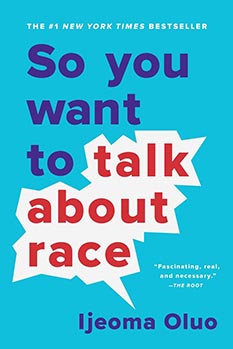It seems always that my reading is timely, that I can draw a correspondence between one book and the next or between ideas on the page and events in the world, as if my reading is guided by an invisible hand. While the decision to read Ijeoma Oluo’s So You Want To Talk About Race was obviously driven by contemporary events—the murder of George Floyd, resurgence of the Black Lives Matter movement, the patent racism that infects the White House—one item trended this week that seems acutely apropos: Harper’s Magazine published “A Letter on Justice and Open Debate” signed by 150 or so literary and cultural types (if you’re willing to stoop low enough to include J. K. Rowling in that class). The letter’s first three sentences frame the concern and, perhaps unwittingly, reveal what is wrong with the concern so framed:
Our cultural institutions are facing a moment of trial. Powerful protests for racial and social justice are leading to overdue demands for police reform, along with wider calls for greater equality and inclusion across our society, not least in higher education, journalism, philanthropy, and the arts. But this needed reckoning has also intensified a new set of moral attitudes and political commitments that tend to weaken our norms of open debate and toleration of differences in favor of ideological conformity.
The key word in this opening salvo is the word “But” which begins the third sentence. We acknowledge the values that underpin a rising tide of global protest. But we don’t like how they’re doing it. The phrase du jour they’re taking aim at is the phrase “cancel culture”—shaming bad behaviour and forcing institutions and employers to punish people who engage in such behaviour. Instead, “[t]he way to defeat bad ideas is by exposure, argument, and persuasion, not by trying to silence or wish them away.” It treats as anathema “the tendency to dissolve complex policy issues in a blinding moral certainty.”
Yet one of the signatories is J. K. Rowling, the woman who insists with blinding moral certainty that there are only two genders, that science proves this, that anyone who claims to be transgendered or gender fluid is self-deluded or perhaps sick and in need of compassionate care, that she is entitled to promote this position at the expense of real people notwithstanding the fact that she has no skin in the game, that those who challenge her are oppressing her because, well, billionaires are a rare and set-upon minority.

The issue, as I see it, is the curious timing of the letter. While the letter itself adopts such general terms that one wonders what, if anything, it’s yammering on about, it seems significant that protesters are still in the streets trying to call police to account for murdering Black people and the letter’s second sentence mentions racial justice and police reform. Let’s assume, at least for the time being, that the letter actually is about racial justice and police reform. In that case, Ijeoma Oluo’s book might have something helpful to contribute to the conversation.
I’m particularly drawn to one of her later chapters titled “But what if I hate Al Sharpton?” She opens by recalling a trope she learned as a child. Strangely enough, I recall learning the same troupe, though I learned it from the white end of the stick. I learned it in the church community where I was raised back when whites in postwar suburbia were singing Kumbaya. MLK nice; Malcom X not-so-nice. MLK martyred; Malcolm X got what was coming to him. If you’re Black (or an ally) promoting racial justice, you won’t get anywhere unless your message follows the MLK pattern: be nice, be peaceful, don’t rock the boat, don’t be confrontational.
The problem with the trope is twofold. First, it mischaracterizes Martin Luther King, Jr., effectively whitewashing the history of his movement by cherry picking the nice quotes from his speeches, excising the anger, and conveniently forgetting how vilified he was in his own time. Simply put, the trope isn’t true. Or at least it exaggerates the differences between King and Malcolm X. Second, the nice MLK approach didn’t work. As Oluo says: “[A] quieter, gentler voice did not bring a quieter, gentler world. All it did was give people the impression that I was okay with living like a second-class citizen.”
While the murder of George Floyd has been the flashpoint for BLM protests, what gives greater force to Oluo’s statement—that making nice doesn’t work—is the sustained way in which Covid-19 has had an inequitable impact upon Black bodies. Covid-19 exposes that structural dimension of racial injustice.
What the trope aims to do is shift attention from the substantive concern of racial justice to the procedural concern of how to address racial injustice. How becomes the threshold and if you don’t meet it, then you never get to address the substantive concern. If you’re too strident, if you’re too loud, too angry, in other words, if you fail to take account of how white people feel, your voice goes unheard. The requirement that you conform to white expectations as a prerequisite to conversation about racial injustice is itself an enactment of racial injustice. However, as Oluo says, the substantive value of racial justice is absolute; it does not depend upon procedural niceties:
Do you believe in justice and equality?
Because if you believe in justice and equality, you believe in it all of the time, for all people. You believe in it for newborn babies, you believe in it for single mothers, you believe in it for kids in the street, you believe in justice and equality for people you like and people you don’t. You believe in it for people who don’t say please.
Oluo then turns to a discussion about tone policing which is a more focused way to describe the shift from substantive to procedural concerns. The most important observation here is that tone policing depends upon an imbalance of power. One party to the exchange has the power to determine how the other party engages it. “To refuse to listen to someone’s cries for justice and equality until the request comes in a language you feel comfortable with is a way of asserting your dominance over them…”
I find it difficult to read “A Letter on Justice and Open Debate” without receiving it as a subtle assertion of dominance. Yes, racial justice is important. But … 150 cultural luminaries, on behalf of vaguely identified cultural institutions, share with the world their anxieties in the face of angry people clamouring for change. I admire many of the signatories, and so I find the following words difficult to set down: this letter is an example of what institutional racism looks like. It is subtle, and it is couched in fine language, which perhaps makes it the more pernicious.
Let me conclude my remarks by pointing to the work of one of the letter’s signatories as a way to illustrate what is wrong with the letter. Elsewhere and in detail, I have excoriated Malcolm Gladwell’s latest book, Talking to Strangers. It is perhaps the worst non-fiction book I have ever read. In it, he undertakes to tone police the dead. Throughout the book, Gladwell presents various theories of human interaction, all of it culminating in an explanatory account of why things went so very wrong when a white police officer pulled over Sandra Bland. The problem with Sandra Bland is that she didn’t like being pulled over for what was an obvious Driving While Black situation. She was angry. She was belligerent. She was uncooperative. In other words, she expected to be treated fairly.
Gladwell analyses the scenario as a case of failed communication and marshals various spanners from his social science toolbox to account for it. The one explanation he fails to mention is the possibility that the police officer was patently hateful, or worse, downright evil. Similarly, the Harper’s letter fails to mention the possibility that current anger in the name of racial justice may be a righteous anger that transcends the trivial strictures of academic politesse. The Harper’s signatories stake their ground on freedom of expression and declare “cancel culture” the enemy. But they make no effort to distinguish the ”censoriousness” that violates such freedom from the hateful speech that undermines its very possibility.
It isn’t cancel culture to insist that people like J. K. Rowling stop perpetrating hatred; rather, it is consequences for bad behaviour. It isn’t censoriousness; it is good parenting. These signatories need to go to their rooms and not come out until they’ve had a good long think about why what they’ve done hurts people.
